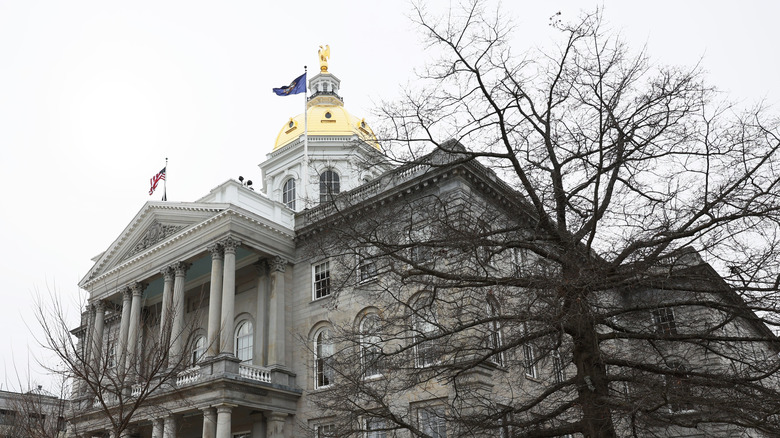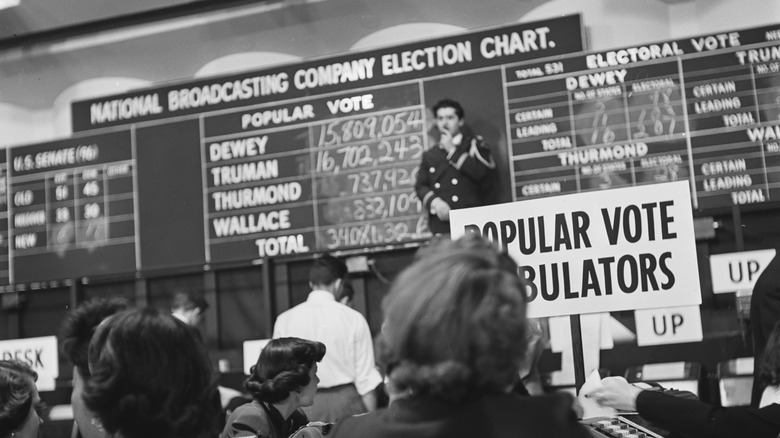What The 2023 Elections Could Predict For The 2024 Presidential Election
Unlike most of its peer democracies, elections in the United States have no officially designated season. Laws or parliamentary dissolutions limit election seasons elsewhere to a few weeks or months, but America's campaign season has been stretching longer and longer since 1976. According to NPR, this is a consequence of big money and competitive primaries. Presidential candidates can declare well over a year before election day, and with American political culture so locked into perpetual campaign mode, every midterm and off-year special election is gleaned over for its potential to say something about presidential elections.
In 2023, NBC News listed gubernatorial races in Kentucky, Louisiana, and Mississippi, a state constitutional amendment in Ohio, and legislative and judicial elections in Virginia and Pennsylvania, respectively, as worth watching for clues. In swing states like Pennsylvania, where a vacant supreme court seat will be filled without impacting the balance of the Democratic-leaning court, the election might show which way voters are leaning. Ohio's proposed amendment and Virginia's legislative elections might show just how salient abortion remains as a campaign issue over a year after Roe v. Wade was overturned. And governor's races around the country may test at the state level how responsive voters are to scandal and how well Democratic office holders can fare in red states in a hyper-partisan era of American politics.
Early results have been good for Democrats
With well over a year to go before the 2024 presidential election as of September 2023, many Democrats still expressed intense anxiety to The Washington Post over their prospects for retaining the White House. Apart from fears over the future of the country should Donald Trump retake the presidency, the rank and file of the party have fretted over Biden's age, the pace of his early campaigning (per CNN), and early polling that shows Biden and Trump essentially tied. Early polling has also left some Democrats pessimistic about their chances of holding onto the Senate after 2024 — though their chances of retaking the House of Representatives look better (per The Hill).
Against this background, two special legislative elections at the state level may be a sign that political winds are more in the Democrats' favor than some fear. Per AP, Democrats held onto their majority in the Pennsylvania House of Representatives when Lindsay Powell won an open seat (Democrats also hold the governor's mansion in the state; Republicans narrowly hold the Senate). In New Hampshire, Democrats flipped a seat in the state House, bringing them up to 198 representatives to match the same number of Republicans (two seats remain vacant, and two representatives are independent). ABC News noted that Democrats overperformed expectations in the special election, one of many such victories throughout 2023, and opined that it could indicate a coming blue wave in 2024.
How predictive are off-year elections?
It's easy to see why pundits, campaign managers, and lay voters would want to pull useful predictions out of special elections, midterms, and odd-year contests. Particularly in the charged political atmosphere of America in the 21st century, any data that could lift hopes, assuage fears, or offer early warnings in time for recalibration are fuel for partisans. But some political forecasters will tell you that off-year elections may have all the predictive power of reading tea leaves.
Networks like CNN do factor in previous election results — including off-year elections — when predicting outcomes and projecting winners. But those previous results make up just one set of data. Statistician Nate Silver wrote on X, formerly known as Twitter, that special elections have very little value in predicting congressional races. Over at FiveThirtyEight, the site Silver founded, Nathaniel Rakich cautioned against using early 2023 election results to try and preemptively call outcomes in 2024. "[These elections] are encouraging signs for Democrats," he wrote ,"but they're also still just a handful of races in a short period of time. ... [W]e'll need a longer track record of special elections before we can say that we're in a lasting pro-Democratic political environment." Per CNN, margins of error in projections based on special election results can also be quite large, further muddying any predictive value. With that said, Rakich has also written that consistent overperformance in special elections can be a good sign for a party heading into congressional or presidential runs.


